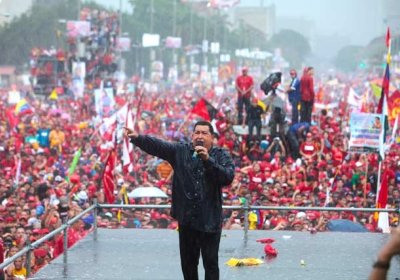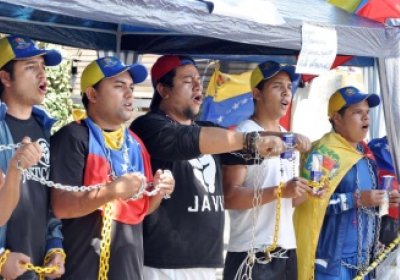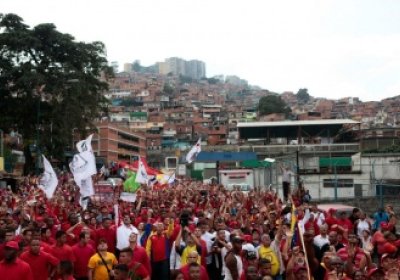Venezuelan media today announced that Venezuelan President Hugo Chavez has died.
At approximately 5.30pm local time on March 5, Vice-President Nicolas Maduro addressed the nation, stating that after nearly three months of treatment in Cuba and Venezuela, Chavez passed away in the Dr. Carlos Arvelo military hospital in Caracas.
“Those who die for life, can’t be called dead,” he stated, after announcing that the president has lost his two year battle with cancer.
Merida
As Washington ramps up anti-Venezuelan rhetoric, its proxies in the South American nation appear to be following a US-backed plan to bring down the democratically elected government.
On February 15, opposition students began a four-day protest outside the Cuban Embassy.
The group of about students allegedly assaulted an elderly passer-by. In the past, members of the same group have allegedly been involved in blockading roads and burning tires during protests in the city of Merida.
Venezuelans rallied in support of their president, Hugo Chavez, on February 18 after his surprise return from treatment in Cuba.
In the early morning, Chavez had announced on Twitter he had arrived in Caracas after more than two months of cancer treatment in Havana.
Chavez tweeted: “We’ve arrived once again to the Venezuelan Homeland. Thank you God! Thank you beloved people! We’ll continue treatment here.”
Upon his return, Chavez was taken to the Dr Carlos Arvelo military hospital in Caracas, where he will continue treatment.
Venezuela's Vice-President Nicolas Maduro and government ministers marched with up to one million people on January 23 to defend the Bolivarian revolution, which has signficantly reduced poverty and promoted new forms of participatory democracy, on the country's Democracy Day. The right-wing opposition march turned out to be a small rally. Further, sectors of the far right have called on the armed forces to resist what they referred to as the “invasion” of “Castro-communism” in Venezuela.
President Hugo Chavez announced on public television on the night of December 8 that he would return to Cuba to receive surgery for new malignant cells, and that vice-president Nicolas Maduro will be in charge during his absence.
Chavez said Cuban doctors informed him that the area where he has previously been affected will need to be operated on again, as new malignant cells have appeared.
He also said that “there are always risks in processes like this” and that “if anything happens to me that hinders me [from performing as president]”, Maduro was his preference to replace him.
Self-employed and informal sector workers in Venezuela are to be included in the nation’s social security system, after an announcement by President Hugo Chavez on April 21.
The Law of Social Security will be changed to allow informally employed workers to register with the Venezuelan Institute of Social Security (IVSS) and make social security payments.
Venezuela’s national minimum wage is to rise 32.25% this year, Venezuelan President Hugo Chavez said on April 7.
In a televised address from Miraflores presidential palace in Caracas, Chavez said the wage rise would take place in two phases, ― first on May 1 and then a further rise on September 1.
The Venezuelan government returned more than 15,800 hectares of ancestral lands to the indigenous Yukpa people on October 12, as Venezuela celebrated “Indigenous Resistance Day” with public events and marches across the country.
Originally designated by then-US president Franklin Roosevelt as “Columbus Day” in 1937, October 12 is the date that Christopher Columbus first “discovered” the Americas.
The anniversary was re-named “Day of Indigenous Resistance” by Venezuelan President Hugo Chavez in 2002 to commemorate indigenous struggle against European invasion and colonisation.
The Venezuelan government will begin a process of recovering 300,000 hectares of land during April that have been in the hands of an unnamed English company, Venezuelan President Hugo Chavez said in an interview during his trip to Uruguay.
Chavez said the process of taking back or “recovering” land had been fundamental to the revolutionary process led by his government. He said this especially so that “worker control” could “prevent companies from exploiting the land and workers, and getting rich and taking the earnings overseas”.
Venezuela marked the 12th anniversary of President Hugo Chavez’s first oath of office in February 1999 on February 2.
Chavez won presidential elections in December 1998 on a pro-poor program that pledged to break the corrupt, two-party system that had dominated Venezuela since 1958.
To commemorate the occasion, Chavez and supporters held four televised site visits in Caracas. The visits highlighted gains in education, food, health and people’s power that have occurred as part of the “Bolivarian revolution” the Chavez government is leading.
Venezuelan President Hugo Chavez expressed his support for workers in a dispute at a Venezuelan Coca-Cola plant conflict in a televised address on February 4.
“If Coca-Cola doesn’t want to comply with the constitution and the law, well, we can live without Coca-Cola,” he said to cheers from the crowd.
Chavez was speaking in Valencia, the capital of Carabobo state, where 1230 workers are striking in a bottling and distribution plant of Coca-Cola Femsa.
More than 1000 members of the United Socialist Party of Venezuela (PSUV) met with President Hugo Chavez on January 19 and decided on five key strategic lines for the next two years.
The discussion included recognition of important weaknesses in the party.
Chavez, who is also president of the governing PSUV, presented the document, Strategic Lines of Political Action of the PSUV for 2011-2012, to the “National Assembly of Socialists” in Vargas state.
About 1440 party leaders were present.
- Previous page
- Page 5
- Next page






